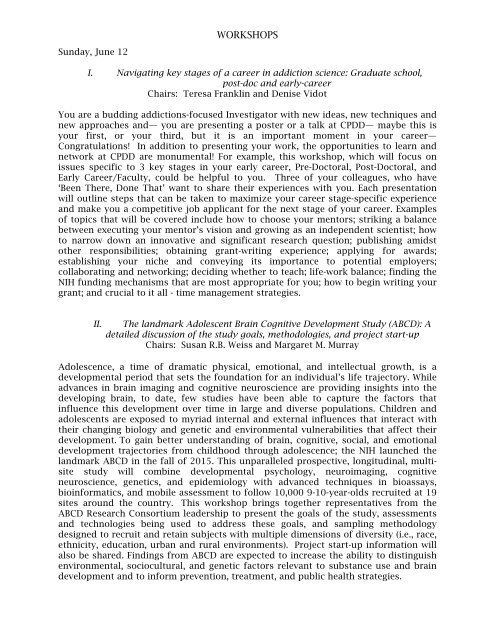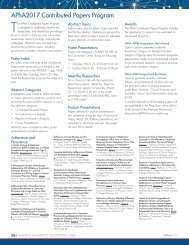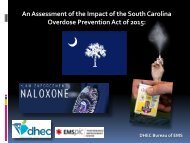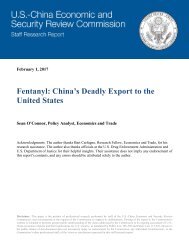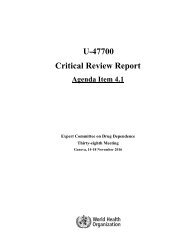CPDD 78th Annual Scientific Meeting Program
2016-78th-CPDD-Program-Book-6-07-16FINAL
2016-78th-CPDD-Program-Book-6-07-16FINAL
You also want an ePaper? Increase the reach of your titles
YUMPU automatically turns print PDFs into web optimized ePapers that Google loves.
WORKSHOPS<br />
Sunday, June 12<br />
I. Navigating key stages of a career in addiction science: Graduate school,<br />
post-doc and early-career<br />
Chairs: Teresa Franklin and Denise Vidot<br />
You are a budding addictions-focused Investigator with new ideas, new techniques and<br />
new approaches and— you are presenting a poster or a talk at <strong>CPDD</strong>— maybe this is<br />
your first, or your third, but it is an important moment in your career—<br />
Congratulations! In addition to presenting your work, the opportunities to learn and<br />
network at <strong>CPDD</strong> are monumental! For example, this workshop, which will focus on<br />
issues specific to 3 key stages in your early career, Pre-Doctoral, Post-Doctoral, and<br />
Early Career/Faculty, could be helpful to you. Three of your colleagues, who have<br />
‘Been There, Done That’ want to share their experiences with you. Each presentation<br />
will outline steps that can be taken to maximize your career stage-specific experience<br />
and make you a competitive job applicant for the next stage of your career. Examples<br />
of topics that will be covered include how to choose your mentors; striking a balance<br />
between executing your mentor’s vision and growing as an independent scientist; how<br />
to narrow down an innovative and significant research question; publishing amidst<br />
other responsibilities; obtaining grant-writing experience; applying for awards;<br />
establishing your niche and conveying its importance to potential employers;<br />
collaborating and networking; deciding whether to teach; life-work balance; finding the<br />
NIH funding mechanisms that are most appropriate for you; how to begin writing your<br />
grant; and crucial to it all - time management strategies.<br />
II.<br />
The landmark Adolescent Brain Cognitive Development Study (ABCD): A<br />
detailed discussion of the study goals, methodologies, and project start-up<br />
Chairs: Susan R.B. Weiss and Margaret M. Murray<br />
Adolescence, a time of dramatic physical, emotional, and intellectual growth, is a<br />
developmental period that sets the foundation for an individual’s life trajectory. While<br />
advances in brain imaging and cognitive neuroscience are providing insights into the<br />
developing brain, to date, few studies have been able to capture the factors that<br />
influence this development over time in large and diverse populations. Children and<br />
adolescents are exposed to myriad internal and external influences that interact with<br />
their changing biology and genetic and environmental vulnerabilities that affect their<br />
development. To gain better understanding of brain, cognitive, social, and emotional<br />
development trajectories from childhood through adolescence; the NIH launched the<br />
landmark ABCD in the fall of 2015. This unparalleled prospective, longitudinal, multisite<br />
study will combine developmental psychology, neuroimaging, cognitive<br />
neuroscience, genetics, and epidemiology with advanced techniques in bioassays,<br />
bioinformatics, and mobile assessment to follow 10,000 9-10-year-olds recruited at 19<br />
sites around the country. This workshop brings together representatives from the<br />
ABCD Research Consortium leadership to present the goals of the study, assessments<br />
and technologies being used to address these goals, and sampling methodology<br />
designed to recruit and retain subjects with multiple dimensions of diversity (i.e., race,<br />
ethnicity, education, urban and rural environments). Project start-up information will<br />
also be shared. Findings from ABCD are expected to increase the ability to distinguish<br />
environmental, sociocultural, and genetic factors relevant to substance use and brain<br />
development and to inform prevention, treatment, and public health strategies.


